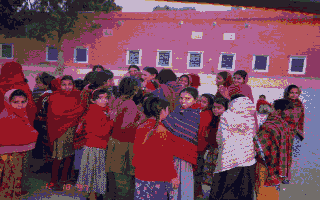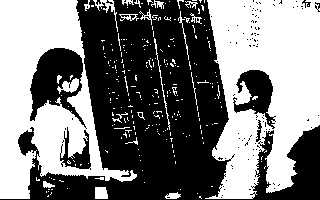
From Illiteracy to Writing Letters in Four Months – An Innovative Experiment for Girls Education

Rajasthan is associated with child marriage, keeping girls uneducated, and the stigma of the death of Roop Kanwar who died by committing Sati in front of her community. Therefore, when I was told that not far from the District Institute of Education and Training, Bikaner, an experiment on education of unschooled and illiterate girls of age group 11 to 14 years is in progress, I thought I should visit it rather than read a report about it.
On reaching Udayaramsar I learnt that about 150 girls from neighbouring villages have come there to live in a camp for six months.The very fact that parents, who have kept their daughters out of school so far and might have already married them or would be planning to perform their marriages, have sent these girls to live in a residential camp for making them literate is a significant achievement in itself. I visited the camp on 18 December 1997. I was accompanied by Dr Dau Dayal Gupta, Principal, DIET- Bikaner, and Mrs. Sushila Ojha, Area Coordinator, Lok Jumbish, Bikaner in my visit to the camp.
When we entered the secondary school in Udayaramsar, where the camp is located, we saw a sight that filled us with joy and made us aware of one of the many silent revolutions taking place in the country amidst the prevailing political instability and the general chaos. Over one hundred girls were playing with each other oblivious of our presence and of their surroundings. At that time they appeared to be the happiest children in the world. After some time when they noticed us all of them beaming with joy shouted namastey. They hugged Sushila ji as though their mother had come to visit them. At a corner of the playground we saw an elderly person, perhaps an octogenarian, who was supervising some construction work. The work was either for repairs to the toilet block or for addition of some facilities to it. I was told that the person is Shri Gordan Singh, a local resident, who comes voluntarily every morning and evening to take care of the camp. Gordan Singh, popularly known as guruji, is the driving spirit of this activity. He has been instrumental in getting financial support from the Gram Panchayat for providing crucial physical facilities to the camp like an approach road and the toilet block. The teachers running the camp soon joined us.
Before I proceed further with my narration I may mention that this camp, which commenced on 23 November, is an initiative for educating 155 near-adolescent illiterate girls to a level which is normally achieved by attending primary school for five years. More than the challenge of planning strategies for rapid learning by girls who were too old to start school with young children was the challenge of convincing their parents to let them stay away from home for six months. That too for getting them educated when they themselves were illiterate. This I was told could be achieved by winning their confidence through door-to-door canvassing. Children were won over to come away from the security of their parents by arranging 2-3 duration children’s fairs as prelude to enrolment for attending the camp. Response was overwhelming. Many of the girls were sent back either on the grounds that they were younger than 11 years or were already studying in schools.
Seven women were selected as instructors. They were trained in teaching in six months language, arithmetic and environmental studies to the level attained in five years of formal schooling and also in training girls in personal hygiene, living together, aesthetics and fine arts such as dancing and music. They were to live 24 hours of each day with their wards. From their brief introductions I gathered some information about them. Smt. Indira Modi is married and has higher secondary education. The other married instructor in this group is Smt. Kiran Swami. She is a B.A. and B.Ed. Ekta Sharma is a student of M.A. (final). Neeta Sharma is a student of B.A. (final). Krishna Singhal is a student of M.A. (previous). Saroj Sharma is a student of 2nd year diploma course in costume design. Kalpana Yadav is M.A. in sociology. It was evident that these women could not have been attracted by the amount of Rs. 2200 paid to them for this assignment each month. More than the teaching skills the job required empathy and love for girls who smelled when they reached the camp and did not know how to wash their face or brush their teeth. I was told that these instructors at times cleaned their toilets, removed their lice, and groomed their hair. For doing this type of work one has to be charged with missionary zeal for accomplishing something extraordinary in life. In the short time I spent with these instructors it became obvious that each one of them, though might not be recognized as successful in life by the conventional norms , was an exceptional person.

Girls were divided into groups based on their age and background. Each group of about 25 children was placed in charge of an instructor for the period of the camp. When we asked them their methodology their answer was that they transact 15-day modules arranged in hierarchical learning sequence. Girls are made to write on sand, on blackboard, and on slate. They sing with children, tell them stories, and play with them. They use a child-centered approach. In addition to maintaining a daily journal they keep track of performance of each child. Assessment of attainment of competencies attempted in fortnightly sessions is made for each child. Children who are unable to master what was attempted are helped to acquire those competencies by taking help of the children who have mastered them. They have discovered that children prefer to learn from other children than from their teachers. They ensure that each child is introduced the new module only after the previous module has been successfully completed.
Children have come to the camp with their own prejudices and habits. It was not uncommon to find them using vulgar abuses when they came to the camp. Instructors as they live with the children have been able to correct their behaviour.
Daily Schedule
The daily schedule of the camp is as follows:
6 a.m. Waking time
7.30 a.m. Physical exercises and prayer
8 a.m. Breakfast
8.30 a.m. to 9.30 a.m. Cleaning of rooms and camp facilities
9.30 a.m. to 12.30 a.m. Language learning session
12.30 p.m. to 2.30 p.m. Lunch and rest
2.30 p.m. to 4 p.m. Arithmetic learning session
4 p.m. to 4.30 p.m. Tea
4.30 p.m. to 5.30 p.m. Environmental studies learning session
5.30 p.m. to 7 p.m. Review of day’s activities and games
7 p.m. to 8 p.m. Dinner
8 p.m. to 9 p.m. Assembly – feedback to instructors
9 p.m. to 10 p.m. Self-study
10 p.m. Sleeping time
Instructors clarified that the textbooks used by them are those, which have been developed by the Lok Jumbish for the primary stage. Their confidence that this time they will be able to take the children to the level of class five is because in similar four camps that were held in January 1997 in four months children could use class four books and the duration of this camp is now six months. A few of the instructors whom we met had also worked in one of the previous camps. They told me that they have with them letters sent by the girls whom they had made literate. They mentioned when they asked a mother why she wants to make her daughter literate, her answer was that if her daughter learns to write she would be able to inform through letters her well being when she will live with her in-laws.
In the four weeks the girls had spent at the camp they have managed to overcome their shyness. They were keen to talk to us. We asked one girl,"What would she gain by getting educated?" She replied that it will help her to safeguard her interest and she will be able to protect herself from being cheated. Although in meals they were given one seasonal vegetable and rotis they were willing to live with inconveniences. They were happy in the camp, and did not want to return to their homes though they missed their parents.
The average expenditure on each girl’s stay per month is around Rs. 900 per month as Rs 3300 were spent per child in the four-month camp. Almost the same amount is spent by the State per child in four years of education in formal schooling. What is coming out clearly is that using this approach it has been possible to reach the same level of attainment in learning in children with added benefits such as learning to live together, taking care of personal hygiene and development of aesthetic sense. I conclude my account of my visit to the Balika Shivar at Udayaramsar by adding that inspiration for the Rajasthan experiments came from a similar programme of the MV Foundation, Hyderabad. They have already educated 5000 girls from 600 villages to the level of class 4 attainment through compressed residential programme of four months duration.
From Illiteracy to Writing Letters in Four Months – An Innovative Experiment for Girls Education
Professor A.N.Maheshwari
National Council of Educational Research and Training
New Delhi, 110016
